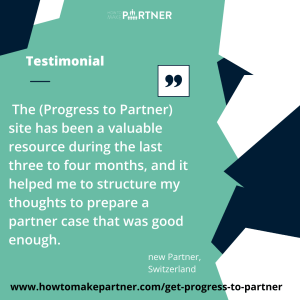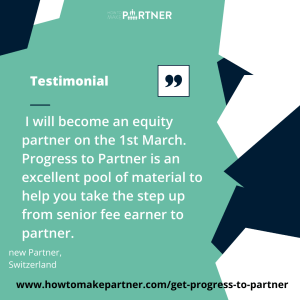How to construct a compelling Business Case for partnership
Thinking of writing your Business Case? Perhaps you’ve been asked to present your Business Case for partner in a few weeks time, but you have no idea where to start. We have worked with many clients to help them to write compelling and persuasive Business Cases for partner, in law, accountancy and consulting firms. Here are my 6 tips on how to construct a persuasive Business Case for partner.
Why you?
You may be the only one in your office or service line going for partner this time around. But your partners will cap the number of new partners they will make up in any one year. This means you are competing with other great candidates for partnership across your firm. As a result you need clarity on the commercial rationale for making YOU up to partner THIS time of asking. This is not an easy question and should involve much soul-searching and conversations with existing partners to gauge their views. Even if your Business and Personal case seems like a ‘slam dunk’, e.g. I am replacing the retiring partner in this department, don’t neglect this step. We’ve seen seemingly cast-iron Business Cases for partnership not make it through one year.
After all, nothing is certain in the professions, and there are always alternatives.
For example, my client’s ‘why you?’ was that he regularly won multi-million-pound contracts for his firm. Unlike other potential partners, he had a great business development track record, and wasn’t just ‘untapped potential’. However, I pushed my client to think further than this and challenged him on why did his partnership really need to promote him to partner as he was already winning large contracts for them…
The lesson from this example is that when you are achieving great things in your current role that would justify being admitted to the partnership, don’t always assume this will happen. After all, if your partners can still get the same results without letting you buy into the partnership, i.e. buy equity from them, why should they?
What is the risk of not promoting you to partner?
The easiest pitch for partnership is one where it is blindingly obvious that you are a shoo-in for partner. However, complacency has scuppered many a potential partner’s place around the partnership table! So, take your time to truly think about the impact on the entire partnership, not you personally, of not promoting you to partner. If there is little or no negative impact in not promoting you, then you have a problem…
Take a step forward to be in control of your own career progression in your firm. Sign up to my weekly tips here and you’ll find out what you need to be working on in your career development (and how to make the time for your career development) to progress your career in your firm.
What is your 3-sentence, 50-word pitch?
Imagine you have to start off with your pitch for partnership. What would be included in your pitch if you only had 50 words or 3 sentences? Your thinking for the ‘why me’ and the ‘risk of not promoting me to partner’ should provide the foundation for your 3 sentence pitch. Another way to think of your 3-sentence pitch is the headlines to the story you want to tell, via your Business Case, of why you need to be promoted to partner.
 Got a Partner Panel Interview happening in the next weeks or months? Don’t leave stuff to chance, and use our FREE partner panel checklist to ensure you are fully prepared and ready to give the best presentation and panel interview of your career. This checklist is just one of the resources included in our subscriber-only site Progress to Partner.
Got a Partner Panel Interview happening in the next weeks or months? Don’t leave stuff to chance, and use our FREE partner panel checklist to ensure you are fully prepared and ready to give the best presentation and panel interview of your career. This checklist is just one of the resources included in our subscriber-only site Progress to Partner.
In this 50-word pitch, it can be incredibly tempting to use big words and internal firm jargon. I urge you to strip this out. The best way to make a big impact, and have easy understanding, is to use short and easy-to-understand words. If an 11-year-old can’t understand your 3-sentence pitch, you need to reword it. Some of the partners reading your Business Case or listening to your pitch in your Partner Panel Interview may:
- Not have English as their first or second language
- Not be familiar with your local culture and customs
- Be from a completely different part of the world or firm
- Have sat through a number of these Partner Panel Interviews and be tired
- Have flown in that day or previous day and be very tired from their travels.
This means the easier you make it to understand your Business Case the more impact you will make, regardless of who is making up your panel on the day.
If you are reading this and feeling despondent. Don’t worry, most lawyers, accountants and consultants like you are taught to be great technicians; not great at business planning and putting together commercial and persuasive documents. Or then pitching these documents and plans! After all, your Business Case for partnership needs to feel commercially sound AND persuasive. To help you do this, I put together our course “How to Build a Cast-Iron Business Case for Partner”. It’s included within our Progress to Partner Academy. This course is one of the most downloaded of any of the 150+ resources within Progress to Partner.
Build your story in your pitch
We wanted to get three key points over with one client in her pitch. (Due to confidentiality, I can’t share these three points openly). These three key points came directly from her 3-sentence pitch. The rest of the guts of her pitch were to reinforce these three key points. Even though she was forced to use a standard firm template for her pitch, we ensured that each bit of her narrative for her story and key numbers backed up the claims in her pitch.
We’ve seen many Business Cases over the years. We can say there is no common standard for what is included in a Partner Business Case. Every firm is different. In fact, the process for making it to partner can be different depending on which part of the firm you are in.
Take a step forward to be in control of your own career progression in your firm. Sign up to my weekly tips here and you’ll find out what you need to be working on in your career development (and how to make the time for your career development) to progress your career in your firm.
 What we know, through years of working with people on Partner Track, are the most common elements included in a Business Case for partnership. We put this into a template (with instructions for you to tailor to make it your own). This is just one of the resources in our Progress to Partner Academy.
What we know, through years of working with people on Partner Track, are the most common elements included in a Business Case for partnership. We put this into a template (with instructions for you to tailor to make it your own). This is just one of the resources in our Progress to Partner Academy.
To give you a taster of the resources in the site, you can click here and we’ll deliver a sample Business Case template for free.
Back up your claims with credibility statements, not waffly words.
It is very easy to slip into regurgitating company jargon and competency frameworks when building your Business Case. After all, many Partnership Application Forms require you to demonstrate your competency against the firm’s competency framework and provide tangible examples of how you role model the firm’s values.
I will be controversial here, but when it comes down to it, no one cares that you are a great team player and leader. What your partners care about is that you can EVIDENCE these claims. So, where is your persuasive and compelling data demonstrating that you are a great team player and leader? If you are going to build a £1+million client portfolio, what is your evidence to back this up? Ideally, the claims you make in your Business Case need to supply the detail for the story you want to flow through your Business Case.
Getting an external perspective
When you are in the thick of client work, progressing your pipeline, it can be very difficult to get the time to stand back and reflect on your pitch for partnership. This is why, as my clients found out, getting an external perspective and input on your Business Case, Personal Case and pitch for partner is very valuable. Of course, we will never know whether my help or not tipped the balance for my clients getting promoted to partnership, but my guess is, it made it much easier for the partners to say yes.
Take a step forward to be in control of your own career progression in your firm. Sign up to my weekly tips here and you’ll find out what you need to be working on in your career development (and how to make the time for your career development) to progress your career in your firm.
What’s in Progress To Partner to help you with your final step up to partner?
Progress to Partner is our membership site that will give your the knowledge AND confidence to fly through this final step up to partner.
It’s like a Netflix for your career in the professions. Find what you need to watch or read at the time you need it. Within the site, you’ll find over 150+ courses, videos, checklists, templates and plans to help you progress your career to partner. Amongst the many curated resources (no more unnecessary scrolling or searching), you’ll find:
- On-demand courses on how to create and articulate your business case, including our most downloaded course “How to Build a Cast-Iron Business Case for Partner”
- A section on the Partnership Admissions process with guides and recordings to help you find your way through the process with your sanity intact.
- Recordings and checklists on how to ace your partner panel interview
- On-demand courses on how to win the right sort of clients
- Proven advice on how to still do the day job and find the time to get through the Partner Track process








